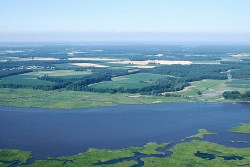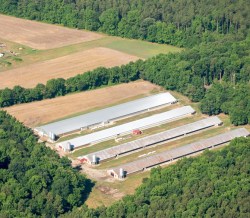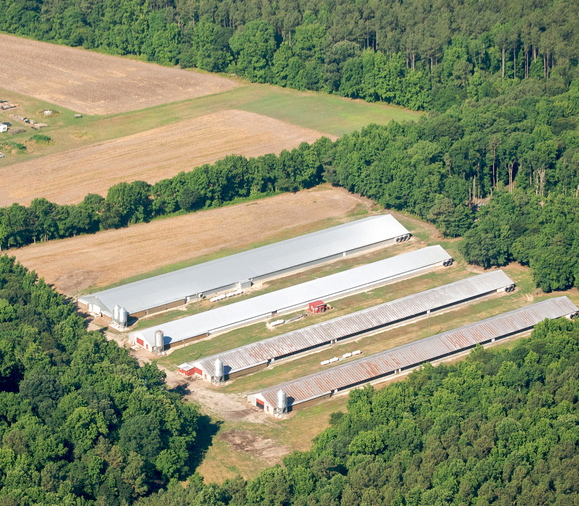
Photo by the Chesapeake Bay Program.
The Gulf of Mexico dead zone seems to get all the attention. Yes, the low-oxygen area that forms every year in the waters surrounding the Mississippi Delta is the largest dead zone — currently around the size of Massachusetts — but it’s not the only one in U.S. waters.
The Chesapeake Bay has a dead zone, too. In fact, it covered a third of the Chesapeake last year and continues to grow. And last month, the University of Maryland’s Center for Environmental Science gave the Bay a D+ in its annual “health report card.”
About a year and a half ago, in response to the crisis, the Environmental Protection Agency (EPA) stepped in to put the states that surround the Chesapeake on a “pollution diet,” meaning the state has to keep its “Total Maximum Daily Load” — whether from agricultural, municipal, or private landowners — down to a minimum.
And where the Gulf dead zone is caused by runoff from the oceans of corn grown in the Midwestern states whose waterways drain into the Mississippi, chicken farms dominate the Chesapeake’s watershed. The Delmarva region (i.e. Delaware, Maryland, and Virginia) has become one of the most intensive poultry farming regions of the country. Industry behemoths Perdue and Tyson contract with operations in the area that add up to tens of millions of birds housed in enormous facilities that generate a lot of chicken crap.
Of course, as MTV taught us Gen-Xers, too much is never enough. Grist reported a couple of years ago on a plan by Perdue to significantly increase its poultry operations in the already taxed region. As a Waterkeepers study of the issue put it at the time:
“Billions of pounds of chicken litter have flowed into the bay in the decades since international poultry conglomerates such as Perdue and Tyson targeted the Delmarva Peninsula for their multi-million-dollar operations.” The industry has been “treating the Chesapeake Bay like an open toilet.”
As you’d expect, Big Ag has reacted badly to the EPA’s attempt to address the pollution problem. The American Farm Bureau filed a lawsuit to stop it. And House Republicans attempted to defund the plan.
But it turns out Big Ag had nothing to worry about. Maryland’s Democratic governor and rising star Martin O’Malley — someone who has a significant say in any Chesapeake Bay cleanup plan — is on Perdue’s side. And it appears that his relationship far exceeds what’s typical between a governor and a large corporation. Or at least one would hope it does.
The advocacy group Food and Water Watch (FWW) has obtained 70 pages of emails [PDF] between O’Malley and Perdue officials — primarily Perdue general counsel Herb Frerichs, with whom FWW says O’Malley went to law school.
Perhaps the most noteworthy exchange between the two men revolves around a statement O’Malley’s press secretary made in an article called “Farmers want Big Chicken held responsible.” In the article he’s quoted as saying:

Industrial-scale chicken houses are a common site in Maryland. (Photo by the Chesapeake Bay Program.)
I think there’s certainly a need from everybody in the industry and on the regulatory side to work together. It certainly doesn’t do anybody any good for poultry farmers to say we own the chickens, but not the manure they produce.
O’Malley sent a series of messages to Frerichs walking back those comments, and letting he and his colleagues know he had “no intention of revisiting co-permitting” — the latter being the state’s attempt to make poultry processing companies responsible for waste management by farmers.
O’Malley then follows up to make sure all is well. He is so deferential to Frerichs, it’s hard to remember who’s the elected official and who’s the constituent. The emails read:
O’Malley -> Frerichs, August 7, 2010 at 7:53 PM
Were you ok with that message I sent to you?
Frerichs -> O’Malley, August 8, 2010 at 6:42 PM
Not sure at this point. I have been witness to some back and forth emails over weekend and need to see how people feel tomorrow and what will work best.
O’Malley -> Frerichs, August 8, 2010 at 7:53 PM
Hmmm. Let me know
O’Malley -> Frerichs, August 9, 2010 at 2:47 PM
How’s my message doing? (It wasn’t that long…)
Frerichs -> O’Malley, August 10, 2010 at 4:24 PM
Sorry for delay. My conclusion is that letter will not be helpful. Jim [Perdue] took this very personally.
O’Malley -> Frerichs, August 10, 2010 at 4:33 PM
So what am I supposed to do? Just leave it alone? Call him, what?
I have to believe this isn’t normal.
But it isn’t just over PR that O’Malley gives Perdue authority. The company apparently also gets to give direction to Maryland’s Department of Agriculture:
O’Malley -> Frerichs, November 5, 2011 at 7:19 PM
What is it about the Secretary of Agriculture’s job performance that you find lacking?
Frerichs -> O’Malley, November 6, 2011 at 7:22 AM
I just feel like I’m trying to push a bunch of stuff and I don’t see him around. He’s not as strong as his counterparts in DE and VA. I work w all three.
O’Malley -> Frerichs, November 6, 2011 at 10:01 AM
I’m guessing you don’t have the personal email of governors of DE or VA, so let me know when Buddy [Earl “Buddy” Hance, Maryland Secretary of Agriculture] can/should be doing more to help you push stuff. I’m serious. I’ll have him call you monday.
It’s not uncommon for state governments to be rife with corruption — both because relationships between representatives and business interests are often very close and because state politics aren’t under the same media microscope that federal politics are.
That said, there’s no indication of financial corruption here — although the Baltimore Sun reports that Perdue did shift its contributions around the time of these emails from the Republican Governor’s Association to the Democratic Governor’s Association, which O’Malley chairs. Still, O’Malley has a good excuse for his frequent interactions with Frerichs: They’re buddies!
But he appears to have lost sight of whose interests he was elected to serve. Because, right now, O’Malley seems to be Governor of the State of Perdue.
So if Maryland becomes a major foot-dragger in implementing the EPA’s Chesapeake Bay cleanup plan, or works to exempt the poultry industry from doing its part, there will be no reason to wonder why. It’s just friends helping friends.


